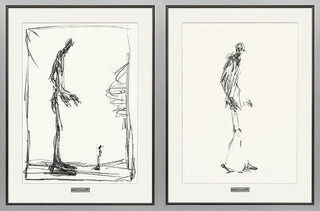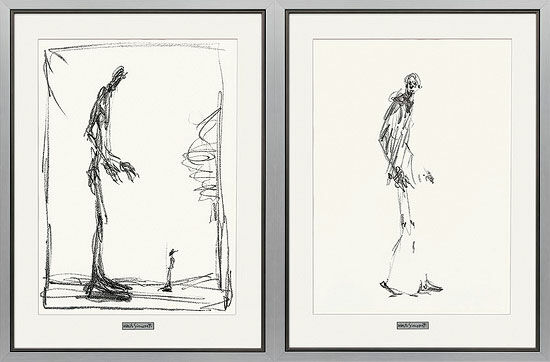Set of 2 pictures "Dessin I (Large and Small) + II (Striding Man)"
Set of 2 pictures "Dessin I (Large and Small) + II (Striding Man)"
Quick info
2 lithographs | hand-glided frame | passe-partout | size 62 x 81 cm each
Detailed description
Set of 2 pictures "Dessin I (Large and Small) + II (Striding Man)"
Giacometti's "Striding Man" adorns the Swiss 100-franc note today. These typical stone lithographs were edited in 1975 on the occasion of the announcement of a large Giacometti retrospective at the Fondation Maeght in Paris.
2 lithographs: "Dessin I (Large and Small)" and "Dessin II (Striding Man)" each framed in a hand-glided frame 62 x 81 cm with a bevel cut passe-partout.
This set contains the following products
About Alberto Giacometti
1901-1966
Born in Borgonovo, Switzerland, Alberto Giacometti is one of the most important artists of the 20th century.
Giacometti was focused on capturing reality in all its complexity, the main subject of his work being the existential depiction of human beings. In the 1930s he was already one of the leading figures of Surrealism but it was not until after the war that his real artistic legacy emerged. Drawing people in the streets inspired him to create his large, thin sculptures – spaced-out, almost disembodied figures that express distance and proximity at the same time.
Today, Giacometti's works are celebrated highlights of all the world's great collections and museums. At auctions, his large bronzes are rarely valued at less than 2-digit million. His "L'Homme qui marche I" (eng.: "The Striding Man I") appear on the current 100 Swiss franc banknote.
The field of graphic arts, that includes artistic representations, which are reproduced by various printing techniques.
Printmaking techniques include woodcuts, copperplate engraving, etching, lithography, serigraphy.
A movement in contemporary art that developed in Europe and America. Following Sigmund Freud’s psychoanalysis, it seeks the actual reality in the subconscious. Surrealism exploits dreams and intoxicating experiences, as well as hypnotic states as a source of artistic inspiration.
Famous artists and sculptors of this movement are Max Ernst, Salvador Dali, Giorgio de Chirico, Yves Tanguy, Joan Miró and René Magritte.




